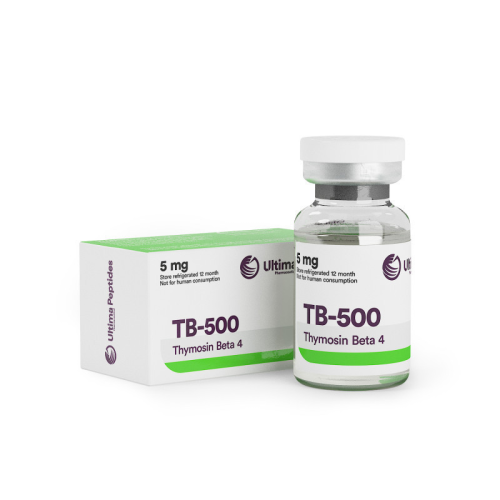Ultima-Thymosin Beta 4 (TB-500) 5mg
- Brand: Ultima Pharmaceuticals - US
- Product Code: Ultima-Thymosin Beta 4 (TB-500) 5mg
- Availability: In Stock
-
$70.00
MANUFACTURER
Ultima Pharmaceuticals - US
WAREHOUSE
USA Warehouse 5
SUBSTANCE
Thymosin Beta-4
,
TB-500 is a synthetic peptide that mirrors the naturally occurring healing protein found in nearly all human and mammalian cells, known as Thymosin Beta 4 (TB4). Research indicates that TB-500 can enhance wound healing, speed up injury recovery, improve flexibility, and reduce inflammation. These beneficial effects arise from TB-500’s impact on the development of blood cells and vessels, cellular differentiation, and cell migration. A key aspect of its healing properties is the peptide’s regulation of actin, a vital protein for cellular structure and repair.
TB-500 DosageTB-500 is available as a freeze-dried (lyophilized) powder. Studies suggest that optimal results are achieved by using 0.9% bacteriostatic sodium chloride to reconstitute the thymosin peptides. Dosages of TB-500 typically range from 5mg to 20mg per week, divided into 2-3 injections. After establishing a baseline in the system, the weekly dosage is usually reduced to a maintenance level, about half or less of the initial amount, which can be administered once a week.
TB-500 is generally injected subcutaneously, but muscle injections can also be performed if preferred.
Store the product at room temperature in a dry environment, keeping it protected from light. An opened vial can be refrigerated for up to 8 days.
Storing TB-500:What is TB-500Research on TB-500 highlights its various properties, leading to numerous global clinical trials assessing thymosin beta-4’s effectiveness in promoting repair of wounds in skin, corneal tissue, and heart. Thymosin beta-4, produced in the thymus gland and present in high concentrations in wound fluids, has been shown to aid in healing damaged tissue.
TB-500 is a naturally occurring peptide abundant in blood platelets, wound fluid, and other tissues. Unlike growth factors, TB-500 peptides are primarily actin-regulating protein peptides. They play a crucial role in protecting, regenerating, and remodeling injured tissues. The gene for Thymosin Beta-4 is among the first activated after an injury occurs.
Found in nearly all human and animal cells, Thymosin Beta 4 is a naturally occurring wound healing peptide. TB-500, a synthetic form of TB4, promotes healing and recovery by assisting in the formation of new blood vessels, muscle fibers, and blood cells, as well as facilitating cell migration—making it particularly beneficial for those who are overworked or injured.
How Does TB-500 Work?TB-500 aids recovery by influencing actin. By enhancing this cellular protein, TB-500 takes advantage of the positive outcomes associated with actin, including the promotion of cell migration and proliferation. This results in new blood vessel formation and regulated inflammation, thereby optimizing healing and recovery. Additionally, the unique molecular structure of TB-500 allows it to travel throughout the body, exerting a systemic effect to assist areas that are injured. Further benefits may include reduced inflammation and improved flexibility, with some reports suggesting potential regrowth and darkening of hair.
What Are the Side Effects of TB-500?Many users report positive outcomes from TB-500, such as faster recovery, reduced inflammation, and enhanced flexibility. The peptide effectively supports recovery from slow-healing injuries, especially those affecting connective tissues like tendons and ligaments, as well as muscle and skin injuries. Feedback from users and researchers indicates that TB-500 tends to have few, if any, serious adverse effects.
While many peptides can cause lightheadedness or nausea upon injection, and flu-like symptoms are common with various peptides, the occurrence of such side effects with TB-500 is reportedly minimal, making it well-tolerated by users.
The information on this website is not a substitute for professional medical advice and is not intended to diagnose, treat, cure, or prevent any disease.

